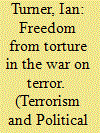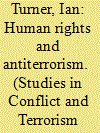| Srl | Item |
| 1 |
ID:
105992


|
|
|
|
|
| Publication |
2011.
|
| Summary/Abstract |
Freedom from torture is regarded as "absolute," meaning that a state cannot infringe the right for purposes which would seem legitimate such as the protection of national security. Indeed, the freedom is viewed as "non-derogable"; that is, infringements are not permitted even in special circumstances such as times of war or public emergency. Is it right, however, with the growth in international terrorism post-9/11, particularly suicide violence, that the freedom should remain without limitation? Perhaps the torture of terror suspects might provide state authorities with intelligence so that acts of atrocity can be averted? To go on and construct a possible argument justifying ill-treatment against a detainee this article questions whether in fact freedom from torture can be categorised as absolute.
|
|
|
|
|
|
|
|
|
|
|
|
|
|
|
|
| 2 |
ID:
116222


|
|
|
|
|
| Publication |
2012.
|
| Summary/Abstract |
In law freedom from torture and ill-treatment is "absolute," meaning that a state cannot infringe the right for purposes that would seem legitimate such as the protection of national security. However, with the growth in international terrorism, particularly suicide violence, should the freedom remain without limitation? This article considers legitimizing torture by reference to the "positive" legal obligation the right imposes on states to prevent harm to individuals by third parties such as terrorists. Assuming such a legal argument could be made out, it is questioned whether adopting such measures of interrogation would in fact outweigh the negative consequences that would inevitably follow from reversing accepted international standards for the protection of, say, detainees from ill-treatment in state custody.
|
|
|
|
|
|
|
|
|
|
|
|
|
|
|
|